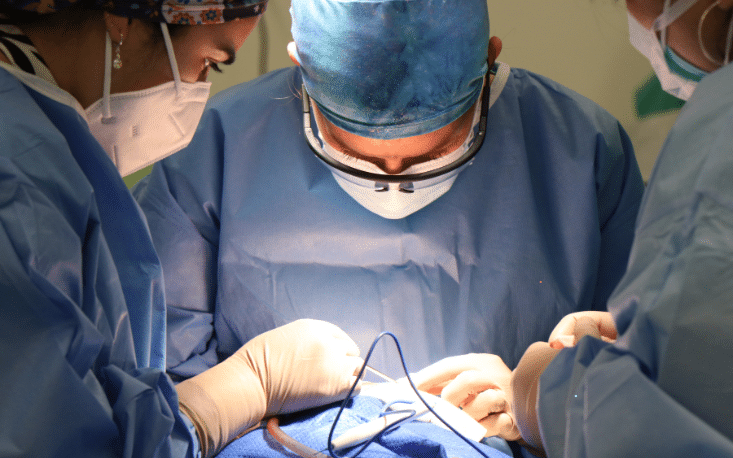ONLINE SCHEDULING AND VIRTUAL CONSULTS AVAILABLE

Anxiety Management Techniques Before Oral Surgery

Feeling anxious before oral surgery is completely normal. Whether it’s the fear of pain, uncertainty about the procedure, or concerns about the outcome, many people experience heightened stress levels leading up to their dental appointments for oral surgery in Plantation. However, managing anxiety is essential not only for your mental well-being but also for ensuring a smoother surgical experience and better treatment outcomes.
In this blog, we’ll explore effective anxiety management techniques that you can utilize before undergoing oral surgery in Plantation. From mindfulness and relaxation exercises to cognitive behavioral strategies, we’ll delve into various approaches that can help alleviate pre-surgery jitters and promote a sense of calm and confidence. By understanding the causes of anxiety and learning practical coping mechanisms, you’ll be better equipped to navigate the challenges of oral surgery with greater ease and comfort.
Let’s dive in and discover how you can prepare yourself mentally and emotionally for your upcoming dental procedure.
Understanding Anxiety Before Oral Surgery
Identifying Common Triggers:
Fear of pain: Many individuals experience anxiety due to the anticipation of discomfort or pain during oral surgery.
Uncertainty about the procedure: Lack of knowledge about the surgical process and its outcomes can lead to heightened anxiety.
Previous negative experiences: Past dental trauma or unpleasant surgical experiences may contribute to heightened fear and anxiety.
Concerns about anesthesia: Fear of adverse reactions or complications related to anesthesia administration can increase anxiety levels.
Impact on Oral Health and Treatment Outcomes:
Delayed treatment-seeking: Anxiety may lead individuals to postpone or avoid necessary dental procedures, resulting in worsening oral health conditions.
Increased risk of complications: High levels of anxiety can interfere with the body’s ability to heal and may increase the likelihood of post-operative complications.
Suboptimal treatment outcomes: Anxiety during the surgery may impair the dentist’s ability to perform the procedure effectively, potentially leading to unsatisfactory results or the need for additional interventions.
Understanding the common triggers and consequences of anxiety before the surgery is crucial for implementing effective management strategies. By addressing these concerns proactively, individuals can better prepare themselves mentally and emotionally for their upcoming dental procedures, leading to a more positive surgical experience and improved treatment outcomes.
Mindfulness and Relaxation Techniques
Deep Breathing Exercises:
- Deep breathing techniques involve slow, controlled inhalation and exhalation to promote relaxation and reduce anxiety.
- Practice diaphragmatic breathing by inhaling deeply through your nose, expanding your abdomen, and exhaling slowly through your mouth.
- Repeat deep breathing exercises several times throughout the day, especially before and during appointments.
Progressive Muscle Relaxation:
- This technique involves systematically tensing and relaxing different muscle groups to release physical tension and promote relaxation.
- Start by tensing specific muscle groups (e.g., fists, shoulders) for a few seconds, then relax those muscles completely.
- Progressively move through your body, tensing and relaxing each muscle group, from head to toe, to induce a state of deep relaxation.
Guided Imagery:
- Guided imagery involves visualizing calming and peaceful scenes to distract from anxious thoughts and promote relaxation.
- Listen to pre-recorded guided imagery sessions or create your own mental imagery of tranquil settings, such as a serene beach or forest.
- Engage all your senses in the visualization process, focusing on the sights, sounds, smells, and textures of your imagined surroundings.
Cognitive Behavioral Strategies
Positive Visualization:
- Visualize successful outcomes of your oral surgery in Plantation, such as a smooth procedure and quick recovery, to cultivate a positive mindset.
- Use affirmations and positive self-talk to reinforce beliefs in your ability to cope with dental procedures and manage anxiety effectively.
Thought Challenging:
- Challenge negative thoughts and beliefs related to the surgery by examining evidence and considering alternative perspectives.
- Replace catastrophic thinking with more balanced and realistic thoughts, focusing on the potential benefits and coping strategies.
Stress Management Techniques:
- Practice stress reduction techniques, such as yoga, meditation, or tai chi, to promote relaxation and improve stress resilience.
- Incorporate regular physical activity, adequate sleep, and healthy lifestyle habits to support overall well-being and reduce anxiety levels.
Communication with Your Oral Surgeon
Importance of Discussing Anxiety:
- Openly communicate your anxiety with your oral surgeon to ensure they understand your concerns and can provide appropriate support.
- Discuss any previous experiences with dental anxiety or specific triggers that may exacerbate your feelings.
- Establishing a trusting relationship with your surgeon can alleviate anxiety and enhance your overall experience.
Addressing Concerns and Asking Questions:
- Take the opportunity to address any concerns or questions you have about the procedure.
- Ask your surgeon to explain each step of the process, including anesthesia options, potential risks, and expected outcomes.
- Understanding the procedure in detail can empower you to feel more confident and less anxious on the day of surgery.
Preparing for Oral Surgery
Following Pre-Operative Instructions:
- Adhere strictly to any pre-operative instructions provided by your oral surgeon, such as fasting requirements or medication protocols.
- Avoid consuming food or drink for the specified duration before surgery to minimize the risk of complications.
- Following pre-operative guidelines can help ensure a smooth and successful surgical experience.
Arranging Transportation and Support:
- Arrange for transportation to and from the oral surgery appointment, as you may be unable to drive following anesthesia.
- Consider having a trusted friend or family member accompany you to provide support and assistance before and after the procedure.
- Having a support person present can offer reassurance and practical assistance during the recovery period.
Managing anxiety before the surgery is essential for a smoother and more comfortable experience. By employing mindfulness techniques, cognitive behavioral strategies, and open communication with your oral surgeon, you can alleviate anxiety and enhance your overall well-being. Remember to follow pre-operative instructions diligently and arrange for support, ensuring a successful and stress-free journey. With the right preparation and support, you can face your oral surgery with confidence and ease.





